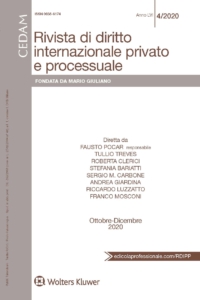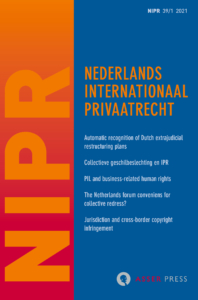by Xandra Kramer (Erasmus University Rotterdam/Utrecht Univeristy) and Ekaterina Pannebakker (Leiden University), editors
-
Introduction
As was briefly announced earlier on this blog, on 29 January 2021, the Dutch Court of Appeal in The Hague gave a ruling in a long-standing litigation launched by four Nigerian farmers and the Dutch Milieudefensie. The Hague Court held Shell Nigeria liable for pollution caused by oil spills that took place in 2004-2007; the UK-Dutch parent company is ordered to install equipment to prevent damage in the future. Though decided almost four months ago, the case merits discussion of several private international law aspects that will perhaps become one of the milestones in the broader context of liability of parent companies for the actions of their foreign-based subsidiaries.
Climate change and related human rights litigation is undoubtedly of increasing importance in private international law. This is also on the radar of the European institutions as evidenced among others by the ongoing review of the Rome II Regulation (point 6). Today, 26 May 2021, another milestone was reached, both for for private international law but for the fight against global climate change, with the historical judgment (English version, Dutch version) by the Hague District Court ordering Shell to reduce Co2 emissions (point 7). This latter case is discussed more at length in today’s blogpost by Matthias Weller.
-
Oil spill in Nigeria and litigation in The Hague courts
 As is well-known Shell and other multinationals have been extracting oil in Nigeria since a number of decades. Leaking oil pipes have been causing environmental damage in the Niger Delta, and consequently causing health damage and social-economic damage to the local population and farmers. Litigation has been ongoing in the Netherlands and the United Kingdom for years (see Geert van Calster blog for comments on a recent ruling by the English Supreme Court). At stake in the present case are several oil spills that occurred between 2004-2007 at the underground pipelines and an oil well near the villages Oruma, Goi and Ikot Ada Udo. The spilled oil pollutes agricultural land and water used by the farmers for a living.
As is well-known Shell and other multinationals have been extracting oil in Nigeria since a number of decades. Leaking oil pipes have been causing environmental damage in the Niger Delta, and consequently causing health damage and social-economic damage to the local population and farmers. Litigation has been ongoing in the Netherlands and the United Kingdom for years (see Geert van Calster blog for comments on a recent ruling by the English Supreme Court). At stake in the present case are several oil spills that occurred between 2004-2007 at the underground pipelines and an oil well near the villages Oruma, Goi and Ikot Ada Udo. The spilled oil pollutes agricultural land and water used by the farmers for a living.
Shortly after the oil spills, four Nigerian farmers instituted proceedings in the Netherlands, at the District Court of The Hague. The farmers are supported by the Dutch foundation Milieudefensie, which is also a claimant in the procedure. The claimants submit that the land and water, which the Nigerian farmers explored for living, became infertile. They claim compensation for the damage caused by the Shell’s wrongful acts and negligence while extracting oil and maintaining the pipelines and the well. Furthermore, they claim to order Shell to secure better cleaning of the polluted land and to take appropriate measures to prevent oil leaks in the future.
The farmers summon both the Shell’s Nigerian subsidiary and the parent company at the Dutch court. To be precise, they institute proceedings against the Shell’s Nigerian subsidiary – Shell Petroleum Development Company of Nigeria Ltd and against the British-Dutch Shell parent companies – Royal Dutch Shell Plc (UK), with office in The Hague; Shell Petroleum N.V. (a Dutch company) and the ‘Shell’ Transport and Trading Company Ltd (a British company). It is this corporate structure that brings the Nigerian farmers to the court in The Hague and paves the way for the jurisdiction of Dutch courts.
-
Jurisdiction of Dutch courts: anchor defendant in the Netherlands and sufficient connection
Both the first instance court (in 2009) and the court of appeal at The Hague (in appeal in 2015) hold that the Dutch courts have jurisdiction. The ruling of the Court of Appeal is available in English and contains a detailed motivation of the grounds of jurisdiction of the Dutch courts. See in particular at [3.3] – [3.9].
Claim against Shell parent company/companies. Dutch courts have jurisdiction to hear the claim against Shell Petroleum based on art. 2(1) Brussels I Regulation, as the company has its registered office in the Netherlands. Furthermore, the jurisdiction of Dutch courts to hear the claims against Royal Dutch Shell is based on art. 2(1) in conjunction with art. 60(1) Brussels I Regulation and the jurisdiction over claims to Shell Transport and Trading Company – on art. 6(1) and art. 24 Brussels I Regulation.
Claim against Shell’s Nigerian subsidiary. The jurisdiction of the Dutch courts to hear the claim against Shell’s Nigerian subsidiary is based on art. 2(1) in conjunction with art. 60(1) Brussels I Regulation and on art. 7(1) of the Dutch Code of civil procedure (DCCP). Art. 7(1) deals with multiple defendants. By virtue of art. 7(1) DCCP, if the Dutch court with jurisdiction to hear the claim against one defendant (in this case this is the Royal Dutch Shell), has also the jurisdiction to hear the claims against co-defendant(s), ‘provided the claims against the various defendants are connected to the extent that reasons of efficiency justify a joint hearing’. The jurisdiction on the claim against the so-called ‘anchor defendant’ (for instance, the parent company) can thus carry with itself the jurisdiction on the other, connected, claims against other defendants.
Both the first instance court and the court in appeal found that the claims were sufficiently connected, despite the contentions of Shell. The Shell’s contentions were twofold. First, Shell stated that the claimants abused procedural law, because the claims against Royal Dutch Shall were ‘obviously bound to fail and for that reason could not serve as a basis for jurisdiction as provided in art. 7(1) DCCP’ (at [3.1] in the 2015 ruling). According to Shell, the claim was bound to fail, because the oil leaks were caused by sabotage, in which case Shell would be exempt from liability under the applicable Nigerian law. This contention was dismissed: the claim was not necessarily bound to fail, according to the first instance court. The appellate court added that it was too early to assume that the oil spill was caused by sabotage. Second, Shell contested the jurisdiction of the Dutch courts because the parent companies could not reasonably foresee that they would be summoned in the Netherlands for the claims as the ones in the case. Dismissing this contention the court of appeal at The Hague stated in the 2015 ruling that ‘in the light of (i) the ongoing developments in the field of foreign direct liability claims (cf. the cases instituted in the USA against Shell for the alleged involvement of the company in human rights violations; Bowoto v. Chevron Texaco (09-15641); Kiobel v Royal Dutch Petroleum Co., 133 S. Ct. 1659 (2013), as well as Lubbe v. Cape Plc. [2000] UKHL 41), added to (ii) the many oil spills that occurred annually during the extraction of oil in Nigeria, (iii) the legal actions that have been conducted for many years about this (for over 60 years according to Shell), (iv) the problems these oil spills present to humans and the environment and (v) the increased attention for such problems, it must have been reasonably foreseeable’ for the parent companies taken to court with jurisdiction with regard to Royal Dutch Shell (see the 2015 ruling at [3.6].
-
Application of (substantive) Nigerian law
Substantive law. All claims addressed in the Court of Appeal ruling of 29 January 2021 are assessed according to Nigerian law. This is the law of the state where the spill occurred, the ensuing damage occurred and where the Shell’s Nigerian subsidiary (managed and monitored by Shell) has its registered office. The events that are the subject of litigation occurred in 2004-2007 and fall outside the temporal scope of Rome II. Applicable law is defined based on the Dutch conflict of laws rules on torts, namely art. 3(1) and (2) Wet Conflictenrecht Onrechtmatige Daad (see the first instance ruling at [4.10]).
Procedural matters. Perhaps because the case of damage to environment as the one in the discussed case, the application of substantive law is strictly tied to the evidence, the court goes on to specify private international law with further finesse. It mentions explicitly that procedural matters are regulated by the Dutch code of civil procedure. In the meantime, the substantive law aspects of the procedure, including the question which sanctions can be imposed, are governed by the lex causae (Nigerian law). The same holds true for substantive law of evidence, including the specific rules on the burden of proof relating to a particular legal relationship. The other, general matters relating to the burden of proof and evidence are regulated by the lex fori, thus the Dutch law of civil procedure (at [3.1]).
-
The ruling of The Hague Court of Appeal
In its the ruling, the Dutch court holds Shell Nigeria liable for damage resulting from the leaks of pipelines in Oruma and Goi. Nigerian law provides for a high threshold of burden of proof that rests on the one who invokes sabotage of the pipelines (in this case, Shell). The fact of sabotage must be (evidenced to be) beyond reasonable doubt. Shell could not provide for such evidence for the pipelines in Oruma and Goi. Furthermore, Shell has not undertaken sufficient steps for the cleaning and limiting environmental damage. Shell Nigeria is therefore liable for the damage caused by the leaks in the pipelines. The amount of the damage to be compensated is still to be decided. The relevant procedure will follow up. The ruling is, however, not limited to this. Shell is also ordered to build at one of the pipelines (the Oruma-pipeline) a Leak Detection System (LDS), so that the future possible leaks could be swiftly noticed and future damage to the environment can be limited. This order is made to Shell Nigeria and to the parent companies.
Spills at Oruma and Goi are are two out of three oil spills. The procedure on the third claim – the procedure regarding the well at Ikot Ada Udo will continue: the reason for the oil spill is not yet clear and the next hearing has been scheduled.
-
Human rights litigation and Rome II
This Shell case at the Dutch court is one in a series of cases where human rights and corporate responsibility are central. Increasingly, it seems, victims of environmental damage and foundations fighting for environmental protection can celebrate victories. In the introduction we mentioned the English Supreme Court ruling in Okpaby v Shell [2021] UKSC 3 of February 2021. In this case the Supreme Court reversed judgments by the Court of Appeal and the High Court in which the claim by Nigerian farmers brought against Shell’s parent company and its subsidiary in Nigeria had been struck out (see also Geert van Calster’s blog, guest post by Robert McCorquodale). Also there is a growing body of doctrinal work on human right violations in other countries, corporate social responsibility, due diligence and the intricacies of private international law, as a quick search on the present blog also indicates.
From a European private international law perspective, as also the discussion above shows, the Brussels Ibis Regulation and the Rome II Regulation are key. The latter Regulation has been subject of an evaluation study commissioned by the European Commission over the past year, and the final report is expected in the next months. Apart from evaluating ten years of operation of this Regulation, one of the focal points is the issue of cross-border corporate violations of human rights. The question is whether the present rules provide an adequate framework for assessing the applicable law in these cases. As discussed in point 5 above, in the Dutch Shell case the court concluded that Nigerian law applied, which may not necessarily be in the best interest of environmental protection. This was based on Dutch conflict rules applicable before the Rome II Regulation became applicable, but Art. 4 Rome II would in essence lead to the same result. For environmental protection, however, Art. 7 Rome II may come to the rescue as it enables victims to make a choice for the law of the country in which the event giving rise to damage occurred instead of having the law of the country in which the damage occurs of Art. 4 applied. In a similar vein, the European Parliament in its draft report with recommendations to the Commission on corporate due diligence and corporate accountability, dated 11 September 2020, proposes to incorporate a general ubiquity rule in art. 6a, enabling a choice of law for victims of business-related human rights violations. In such cases a choice could be made for the law of the country in which the event giving rise to the damage occurred, or the law of the country in which the parent company has its domicile, or, where it does not have a domicile in a Member State, the law of the country where it operates. This draft report, which also addresses the jurisdiction rules under the Brussels Ibis Regulation was briefly discussed on this blog in an earlier blogpost by Jan von Hein.
-
Shell and climate continued: The Hague court strikes again
Today, all eyes were on the next move of The Hague District Court in an environmental claim brought against Royal Dutch Shell Plc (RDS). It concerns a collective action under the (revised) Dutch collective action act (see earlier on this blog by Hoevenaars & Kramer, and extensively Tzankova & Kramer 2021), brought – once again by Milieudefensie, also on behalf of 17,379 individual claimants, and by six other foundations (among others Greenpeace). The claim boils down to requesting the court to order Shell to reduce emissions. First, the court extensively deals with the admissibility and representativeness of the claimants as part of the new collective action act (art. 3:305a Dutch Civil Code). Second, the court assesses the international environmental law, regulation and policy framework, including the UN Climate Convention, the IPCC, UNEP, the Paris Agreement as well as European law and policy and Dutch law and policy.
Third, and perhaps most interesting for the readers of this blog, the court assesses the applicable law, as the claim concerns the global activities of Shell. As Weller has highlighted in his blogpost that discussion mostly evolves around Art. 7 Rome II. Milieudefensie pleaded that Art. 7 should, pursuant to its choice, lead to the applicability of Dutch law and, should this provision not lead to Dutch law, on the basis of Art. 4(1) Rome II. In establishing the place where the event giving rise to the damage occurs the court states that ‘An important characteristic of the environmental damage and imminent environmental damage in the Netherlands and the Wadden region, as raised in this case, is that every emission of CO2 and other greenhouse gases, anywhere in the world and caused in whatever manner, contributes to this damage and its increase.’ Milieudefensie holds RDS liable in its capacity as policy-setting entity of the Shell group. RDS pleads for a restrictive interpretation and argues that corporate policy is a preparatory act that falls outside the scope of Art. 7 as ‘the mere adoption of a policy does not cause damage’. However, The Hague Court finds this approach too narrow and agrees with the claimants that Dutch law applies on the basis of Art. 7 and that, in so far as the action seeks to protect the interests of Dutch residents, this also leads to the applicability of Dutch law on the basis of Art. 4.
The judgment of the court, and that’s what has been all over the Dutch and international media, is that it orders ‘RDS, both directly and via the companies and legal entities it commonly includes in its consolidated annual accounts and with which it jointly forms the Shell group, to limit or cause to be limited the aggregate annual volume of all CO2 emissions into the atmosphere (Scope 1, 2 and 3) due to the business operations and sold energy-carrying products of the Shell group to such an extent that this volume will have reduced by at least net 45% at end 2030, relative to 2019 levels’.
To be continued – undoubtedly.
 The second issue of 2021 of the Rivista di diritto internazionale privato e processuale (RDIPP, published by CEDAM) has been released. It features:
The second issue of 2021 of the Rivista di diritto internazionale privato e processuale (RDIPP, published by CEDAM) has been released. It features:

